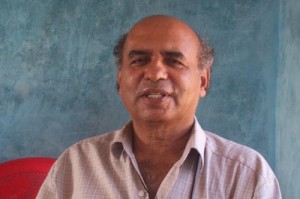A Request To The Russian President On His Visit To India
By Thomas Kocherry
27 March, 2012
Dianuke.org
President Dmitry Medvedev.
The President of the Russian Federation
Dear Honourable President,
Greetings!
We, the people of southern districts of Tamil Nadu and Kerala have been struggling against the Koodankulam Nuclear Power Project (KKNPP) at Koodankulam in Tirunelveli district, Tamil Nadu, India since its inception in the 1980s.
The KKNPP reactors from Russia are being set up without sharing the Environmental Impact Assessment (EIA), Site Evaluation Study and Safety Analysis Report with the people, or the people’s representatives and the press. No public hearing has been conducted for the first two reactors either. The KKNPP project has been imposed on an uninformed and unwilling population throwing all democratic precepts and values of our country to the wind.
The people of Tamil Nadu and Kerala are deeply concerned about our safety and well-being as the KKNPP reactors pose grave and serious threats. The actual siting of the reactors, the quality of construction and the pipe work and the overall integrity of the KKNPP structures have been called into question by the very workers and contractors who work there in Koodankulam. Similarly, the then Minister of State in the Ministry of Environment and Forest (MoEF) Mr. Jairam Ramesh announced a few months ago that the central government had decided not to give permission to KKNPP 3-6 as they had violated the Coastal Regulation Zone stipulations. It is pertinent to point out that KKNPP 1 and 2 are also violating CRZ terms.
The 2004 December tsunami did flood the KKNPP installations. There was a mild tremor in the surrounding villages of Koodankulam on March 19, 2006. On August 12, 2011, there were tremors in 7 districts of Tamil Nadu. These happenings heighten our anxieties and worries about the possibility of natural disasters occurring in the project area.
Similarly, more than 1.5 million people live within the 30 km radius of the KKNPP which far exceeds the AERB stipulations. It is quite impossible to evacuate this many people quickly and efficiently in case of a nuclear disaster.
There have been international concerns about the design, structure and workings of the untested Russian-made VVER 1000 reactors. Even a Russian government-sponsored study has found serious issues with the VVER 1000 reactors.
The issue of liability for the Russian plants has also not been settled yet. Defying the Indian nuclear liability law, Russia insists that the Inter-Governmental Agreement (IGA), secretly signed in 2008 by the Indian and Russian governments, precedes the liability law and that Article 13 of the IGA clearly establishes that NPCIL is solely responsible for all claims of damage.
Our expert team has identified several serious safety issues with regards to the KKNPP project which we have listed below.
Most importantly, the KKNPP and the Nuclear Power Corporation of India Ltd. (NPCIL) officials have not conducted any mock drills and evacuation drills in the 30 km radius. The NPCIL informed us in its letter dated January 9, 2012 (No. NPCIL/VSB/CPIO/1400/KKNPP/2012/44) that Off-site “Emergency Exercise has not been carried out in KKNPP.” In a subsequent letter dated February 16, 2012 (No. NPCIL/VSB/CPIO/1598/KK/2012/300) NPCIL stated: “As per the AERB guidelines, offsite emergency exercise shall be conducted prior to regular operation of a Nuclear Power Plant. AERB guidelines will be followed in KKNPP in this regard.” However, we hear reliably that the KKNPP officials are trying to load the fuel rods in the reactors against the AERB and other international stipulations.
Ahead of President Dmitry Medvedev’s visit to India, Russian Ambassador Alexander M. Kadakain said the agreements for the units III and IV of the Koodankulam nuclear plant were “almost ready”. Moscow, he underlined, was hoping that the nuclear liability law won’t apply to them. If it is so safe how can you be out from the Nuclear Liability Law?
Remember Chernobyl Accident, Three Mile Island Accident and Fukushima Accident are frightening us. Are you not concerned about our future? We do not want to be victims of Nuclear waste, Radiation in and around Koodankulam, and an accident.
There are many other options before us: transmission of Electricity through underground cable transmission, by using CFL bulbs, by alternate production of electricity through Wind, Solar and Bio-mass. The present investment on Koodankulam Plant can be converted into a Gasoline Plant.
In the light of the above situation, we would very much like to request you to intervene in the KKNPP matter and stall its commissioning. Looking forward to hearing from you soon, we send you our best regards and all peaceful wishes.
Thomas Kocherry
National Fishworkers’ Federation
7/48 Vayakarai, Manavalakurichy, KK DT, Tamilnadu, India-629252, [email protected]
 Thomas Kocherry is a social activist, priest, and lawyer who helped found the Kerala Swatantra Matsyathozhilali Federation. He is known as a critic of globalisation in India. He is Coordinator of National Fish Workers Forum.In 1999, he was the recipient of the Sophie Prize, a Norwegian award for environment and development.
Thomas Kocherry is a social activist, priest, and lawyer who helped found the Kerala Swatantra Matsyathozhilali Federation. He is known as a critic of globalisation in India. He is Coordinator of National Fish Workers Forum.In 1999, he was the recipient of the Sophie Prize, a Norwegian award for environment and development.
Due to a recent spate of abusive, racist and xenophobic comments we are forced to revise our comment policy and has put all comments on moderation que.


